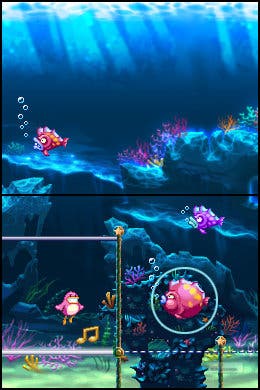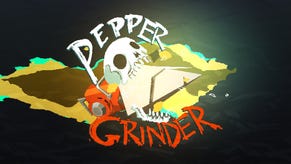Maestro: Jump In Music
Whatever that means.
In a world where music games are dominant, it always catches our attention when games attempt to implement rhythm in a more creative way than aping Harmonix's scrolling notes. Maestro: Jump in Music is an oddly titled and lovable platformer that weaves music into its running and jumping, punctuating every jump you make or object you collect with a thump or a twang. It takes a simple concept and executes it in a fresh, creative and unique way.
As the music plays, Maestro the little pink birdie (I like to think of him as a penguin, because penguins are awesome) runs from left to right across the screen, suspended on a sort of tightrope. You stroke the tightrope upwards or downwards to pluck a note and make him jump or drop down. Collectable icons - fruit, stars or tiny golden angels, depending on what level you're playing - are scattered around the place, and collecting them also hits a note. The platforming augments the music: do well, collect things and jump at the right times and you embellish the track with drum beats and timely strums; do badly and all you get is tinny background music.
The tracks get harder, obviously, and throw more rhythm icons into the mix - tapping enemies as they fly towards you, holding the stylus over a wafting strand of seaweed, strumming a harp - but it's always a game about running and jumping, tapping and strumming deftly in time to the beat. It riffs on Taiko and Ouendan, guiding your eyes with contracting circles and targets and other visual cues to help you find just the right timing.

Nothing helps as much as familiarising yourself with the track and the layout of the level though. On harder difficulties, like most platformers, Maestro is about memorisation rather than instinct. Happily, every song has a Practice option that pops up a few seconds before the option to play the track for points - which gets very annoying, actually, as you often impatiently hit the Practice option by mistake.
The 24 songs themselves are a motley selection of classical and pop 'hits' - I think the youngest song on there is from the late eighties. This certainly isn't a game you'll be playing for the music; even if you were sufficiently passionate about traditional Russian song Otchi Chornye to buy a game featuring a pink penguin just to hear it, you probably wouldn't be happy with the cheerful little midi version that pumps from the DS' wee speakers. The slightly mangled songs have their charm, though. I've been unable to get Maestro's tinny, chirpy little take on Our House our of my head all week. It's lovably retro, and reminds the universally terrible versions of 'popular' hits that used to soundtrack games of the 16-bit era, and of my mum's cheesy faux-classical phone ringtone.








